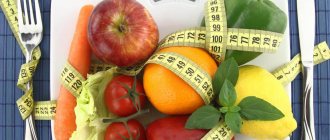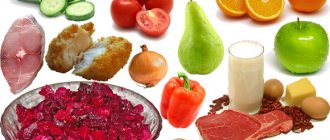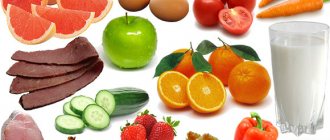Vegetarianism is one of the most popular nutrition systems today. Her followers assure everyone around her that she is the source of longevity, youth and inexhaustible health, and allows you to quickly and permanently get rid of a huge number of diseases. There are both supporters and opponents of this lifestyle trend, who note the negative impact of a vegetarian diet on the body.
So who is right and who is wrong? Let's take a closer look at vegetarianism and learn about all its pros and cons.
All the pros and cons of vegetarianism: what is it?
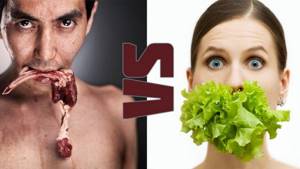
What is the meaning of the vegetarian movement? It is based on one important principle: eating foods exclusively of plant origin with a complete ban on animal products, including eggs, milk, honey (or their partial exclusion from the diet).
Many uninitiated people believe that by refusing meat products and other items of animal origin, the menu becomes completely boring, banal, and the balance of nutrients is lost. However, you can easily argue with this if you know which products and in what quantities are available to vegetarians:
- 300 types of vegetables and root crops.
- 600 types of fruits.
- 200 types of nuts.
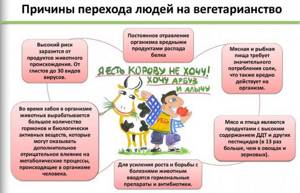
The essence of a vegetarian food system

Before switching to a “plant-based life”, find out whether such a nutritional system will really benefit you and improve your body.
Complete abstinence from meat and almost all animal products. People who adhere to this principle of nutrition believe that eating meat leads to the formation of harmful compounds in the body, reducing life expectancy.
- Of course, people approach vegetarianism in different ways. A person who does not eat killed animals out of philosophical convictions does not care how this affects his mortal coil.
- Supporters of vegetarianism justify their chosen food system religious, moral and economic motives. Many of them believe that man was created as a consumer of exclusively plant foods, and that it is precisely this kind of food that is beneficial for maintaining health, protecting against many diseases and achieving longevity.
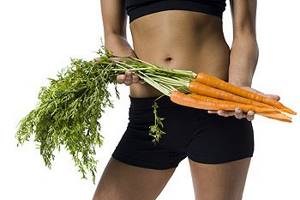
- It's another matter if you make such a decision for reasons of health, well-being and a beautiful figure.
Strict vegetarians - vegans - eat exclusively foods of plant origin. Some people focus on fruits and nuts (fruitarians), while others prefer only grains (macrobiotics).
Lacto-vegetarians allow the inclusion of milk and dairy products in their diet.
Lacto-ovo vegetarians eat eggs along with plant foods and dairy products.
Sproutarians base their diet primarily on sprouts with the addition of raw foods.
Young vegetarians enjoy eating fish and white poultry meat, but dairy products are prohibited for them.
Raw foodists exclude from their diet everything that is cooked at temperatures above 18 degrees.
| Eggs | Milk | Honey | Plant food | ||
| Lacto-ovo vegetarianism | No | Yes | Yes | Yes | Any |
| Lacto-vegetarianism | No | No | Yes | Yes | Any |
| Ovo-vegetarianism | No | Yes | No | Yes | Any |
| Veganism | No | No | No | No | Any |
| Vegetarian raw food diet | No | No | No | No | Not heat treated (above 18 degrees) |
| Fruitarianism | No | No | No | No | Fruits, nuts and everything that can be obtained without damaging the plant |
| Sous vegetarianism | No | No | No | No | Except for plants that have a strong odor, such as onions and garlic |
| Sproutarianism | No | No | No | No | Mainly sprouts with added raw vegetables and fruits |
| Young vegetarianism | Fish, white poultry | No | No | No | Any |
In an ordinary healthy life, it is quite possible to do without animal protein. In addition, it is very difficult for the body to digest and its absorption requires a large amount of energy and microelements. But the body could direct this energy to other creative purposes.
It should be remembered that after digestion, use and breakdown of proteins, they decompose, and uric acid salts are released, which are harmful to the human body. These salts not only form the basis for various stones, they primarily destroy fluid-rich cells.
An adult needs enough proteins from plant foods: soybeans, peas, beans. Many experts believe that a woman “after forty” does not need red meat at all - fish and dairy products are enough.
contraindicated for colitis: due to inflammation of the mucous tissue, the intestines will not be able to digest plant foods, which threatens fermentation and flatulence.
A vital organ, the pancreas, is also affected. If its work is disrupted, then diarrhea will overcome, which can only be gotten rid of with medication.
Vegetarians often switch to a raw food diet. It is believed that eating raw foods is natural for humans, because our ancestors - monkeys - did not cook soup. For centuries, people still ate boiled and steamed food. Our body is already accustomed to processed food. By switching to a raw food diet, we force our body to work under extreme conditions.
In order for vegetarianism not to cause harm, two conditions must be met: age zones must be acceptable (after 25 years) and the person must be absolutely healthy.
Of course, periods of life such as pregnancy and lactation are excluded. After all, meat-eating is valuable because it abundantly supplies the body with proteins necessary for the construction of cells. That is why life begins with a few drops of mother's milk!
- You are under 25 years old: a growing body especially needs protein and in large quantities.
- You are expecting a baby: a miscarriage is likely.
- You do heavy physical labor or fitness, training intensely most days of the week: Protein helps muscles recover and improves strength and endurance.
- If you have been seriously ill or are sick: even with a runny nose, a little protein “goes away” with the discharge.
- If you suffer from anemia: your body already lacks iron.
- Before strictly limiting yourself to animal proteins, be sure to consult your doctor if you have diseases of the gastrointestinal tract (gastritis, ulcers, etc.).
Vegetarianism involves eating a lot of vegetables and fruits. Any plant food is rich in fiber, pectins, monosaccharides. Fiber, passing through the digestive tract, acts like a brush.
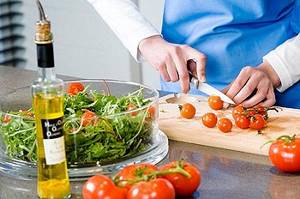
Thanks to it, our organs get rid of toxins, remnants of undigested food and salt deposits. This cleansing is beneficial for the body. But what happens if there is too much fiber? It will act on the gastrointestinal mucosa like sandpaper. After all, in essence, vegetarianism is a mono-diet.
By switching to plant foods, a person deliberately refuses many fat-soluble vitamins, which are found only in products of animal origin.
First, the body will use up previously accumulated reserves of vitamins, and then simply learn to survive in conditions of acute shortage of vitamins and amino acids.
In India, vegetarianism is practiced by the majority of the population, and without any health problems. But you also need to take into account the climate. In India, fresh fruits and vegetables are available almost all year round and in a variety that we have never even dreamed of.
Here, winter lasts for six months, when all the vegetables and fruits in stores are either greenhouse or imported. It is doubtful that such products can satisfy the need for vitamins in the required volume.
To do this, they would have to be eaten in gigantic quantities, while most of us do not gain even 1 kg of vegetables and fruits per day. This is not in our traditions.
As does regular consumption of soy (the only plant protein that contains essential amino acids). For residents of Russia, veganism is almost impossible... But lacto-ovo vegetarianism is acceptable.
Vegetarianism is stressful for the gastrointestinal tract.
For an absolutely healthy adult, such a nutritional system will not cause problems. But before you dare and switch to vegetarianism, find out if you have any gastrointestinal diseases. It is necessary to undergo a full examination by a gastroenterologist, be sure to do an ultrasound examination of the internal organs, as well as gastroscopy. You may not be aware of existing diseases, and a sudden change in the nutritional system will serve as an impetus for all sorts of exacerbations.
After all, if you have high acidity of gastric juice, then even the usual tomatoes can provoke active acid secretion and, as a result, the development of peptic ulcers. Be sure to listen to how you feel and take your first steps in vegetarianism under the supervision of a doctor. I would recommend simply introducing 1-2 vegetable fasting days a week into your diet.
- Plant foods contain fewer calories and fat.
- When preparing dishes, less salt is used, due to which water is quickly removed from the body along with the toxins dissolved in it.
- The call for vegetarians to consume more vegetables and fruits in raw and fresh form is quite rational. Such products serve as a valuable source of vitamins, minerals and organic acids; in addition, they are rich in ballast substances that enhance intestinal motility and remove toxins and excess cholesterol from the body.
- Experts promise vegetarians a lot of bonuses: low cholesterol, a strong heart, good digestion.
- Recently, scientists from California's Loma Linda University found that vegetarians are less likely to be overweight and have diabetes.
- And doctors from Oxford University say that supporters of a plant-based diet have a lower risk of cancer. In general, by 12%, and in some cases (leukemia, stomach cancer) - by as much as 45%!
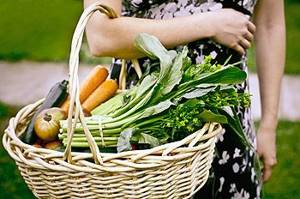
- The body needs iron, its absence leads to anemia, hormonal imbalance, loss of appetite, and disorders of the nervous system. The reason for all these disorders lies in the fact that iron is absorbed in the body only from compounds present in the greatest quantities in red meat, and there are almost none in plant foods. Therefore, even if vegetarianism can be practiced for weight loss, it is only for a short time.
- Those who deprive themselves of animal food often have a deficiency of vitamin B12, which activates cell division and is responsible for skin renewal, as well as for the adequate functioning of the nervous system.
- With vegetarianism, the body does not gain enough protein. In plant foods, there is not much of it in principle, and plus it is not so easy for the body to obtain it. In legumes, which vegetarians usually rely on so much, the protein is “paired” with a trypsin inhibitor, which prevents its absorption.
- Plant foods are practically unable to completely replace animal foods, although almost all amino acids can be found in them.
- Official medicine is adamant: a healthy diet is a balanced diet. The diet of an adult should consist of 15% proteins, 25-30% fats, and 55-60% carbohydrates, and it is very difficult to maintain these proportions in the absence of beef, chicken, and even more so milk and eggs.
The transition to vegetarianism should be as smooth as possible, and ideally coincide with a quiet period in your life. Although giving up meat is not so terrible for the body, any changes are stressful for it. Therefore, it is best to start practicing vegetarianism in the summer, during vacation. Diversify your diet to the maximum: mushrooms, peas, lentils, soybeans, yoghurts, various cereals, fruits and vegetables... This will allow you to gain more nutrients. Be prepared to pay for this abundance: although in other countries they save money with vegetarianism, in our country it is expensive.
And don't expect to lose weight on it without extra effort. Vegetable oil is “heavier” than butter and even lard. Bananas, grapes and many other fruits are too sweet, and grains should not be eaten uncontrollably. Balancing a vegetarian diet is more difficult than usual, and sticking to it is not easy.
Leaving vegetarianism (if you come to such a decision) should be gradual. Adapting to your diet, the body eventually stops producing the necessary enzymes. And if you then want to return to this or that product, you simply will not digest it, and you will get an upset stomach, similar to poisoning. Add the meat in small portions, about 30 g each, in ground form.
When a person becomes a vegetarian without any reason, you need to pay attention to this. And consult a psychologist.
There are many diets that are close to vegetarianism, but, in fact, are not vegetarianism. For example, flexitarianism, which allows meat, but a little bit at a time. This option is the closest to a regular healthy diet.
Vegetarianism is not just about giving up meat. A person who comes to this nutrition system begins to lead a healthy lifestyle: plays sports, gets rid of bad habits.
Types of vegetarianism
Vegetarianism is not a diet program, like, for example, a diet for obesity, but a real lifestyle that must be followed constantly. Depending on the diet being formed, there are several main types of the system:
- Lacto-vegetarianism. This is the most common option followed by most people around the world. What's the point? His followers do not accept absolutely all “animal” products, except milk. It remains the only source of protein, so necessary for the normal functioning of the body. Currently, this variety is maximally “protected” from attacks by opponents of the vegetarian trend, since there is no way to prove its harm, because protein foods are not completely excluded from the menu.
- Ovo-vegetarianism. The variety is approximately similar to the one mentioned above, only the diet contains not dairy products, but eggs. Vegetarians in this direction also believe that animal protein should be present in life, but only in egg format. This particular product is not considered the result of killing animals. The main argument of followers is that there is no life in a store-bought egg, it is not fertilized and cannot feel pain. However, discarding all the subtleties of vegetarianism of this type, we should not forget that both milk and eggs, of course, are not considered products of slaughter, but are obtained through the forced exploitation of animal organisms.
- Lacto-ovo vegetarianism. This variety involves the consumption, in addition to plant foods, eggs and dairy products. This is the easiest option to switch from a regular diet. There are all conditions for creating a balanced diet. Just because it's easy to go lacto-ovo vegetarian doesn't mean other options are bad. It’s just that at this stage of life, your body accepts this type of nutrition much easier.
- Veganism. This is the strictest form of vegetarianism, which involves the absolutely complete exclusion of any animal products from the diet, without any exceptions. They switch to it, most often, consistently, smoothly, bypassing the stage of lacto- or ovo-vegetarianism. The transition is difficult, but the benefits for the body of a vegan menu are enormous.
- Raw food diet. In another way, this variety is called “live food”. The raw food diet is based only on plant foods, which, moreover, do not undergo heat treatment. Raw food diets are often used for medicinal purposes.
- Fruitarianism. This is the sweetest type of vegetarian trend. As you already understand, his followers eat only fruits and dried fruits. In rare cases, you can eat juicy greens, some nuts and seeds. At the very beginning of following the path of fruitarianism, it is important to add small amounts of vegetables and root vegetables to your diet. But over time, it will be necessary to abandon them in order to completely switch to fruit components.
- Mono-eating. His followers eat a specific product at every meal. For example, two bananas are eaten for lunch, pears for dinner, etc. This type of vegetarianism is considered one of the healthiest, since products consumed separately are absorbed much more efficiently. The body is practically not clogged with waste and toxins, while receiving all the necessary nutrients.
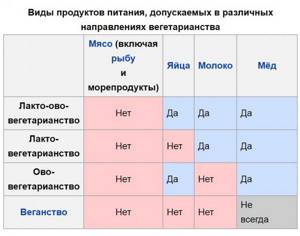
Cons of a raw food diet and the beginning of mindfulness
It lasted me exactly a month. A constant feeling of hunger was accompanied by a loss of strength and a drop in all athletic performance. I understood that I was doing something wrong, but I couldn’t understand what exactly. A few meltdowns over processed food forced me to return to veganism and study this issue more deeply. It was from this moment that my journey as a nutritionist began. Endless training, books, articles, seminars - I was shocked by how many nuances there are in the issue of properly building a diet.
After spending a year experimenting with my diet, I decided it was time to get really conscious about my diet. Veganism, raw food diet, constant fasting - all this became stress for my body. My health worsened, I lacked strength, and my digestion was disrupted. I realized that it was time for me to study the topic of nutrition in an unemotional and rational way.
Training to become a nutritionist opened my eyes to a lot of things. My diet was terribly balanced, I was constantly lacking in protein and fat. Sometimes I overeated erratically, sometimes I was critically undernourished. Trying to balance my diet led me to the understanding that being a vegan in Moscow is very difficult. Possible, but difficult.

Pros of vegetarianism
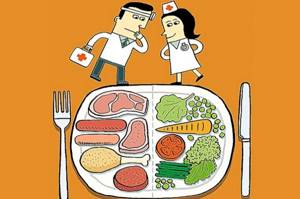
Since ancient times, people have learned that giving up meat/fish ensures health and longevity. The advantages of vegetarianism can still be seen today, otherwise this trend would not have so many followers:
- Strong immunity. The diet is made up of an incredible amount of foods, so the body receives sufficient quantities of the necessary nutrients. Scientists have found that during epidemics, vegetarians get sick much less.
- Normalization of the digestive system. The fiber contained in fruits and vegetables improves the functioning of the stomach and effectively cleanses the intestinal microflora. People stop suffering from constipation.
- Prevention of various diseases. Vegetarians do not know what heart and vascular diseases are. This fact has been officially established and cannot be refuted. The main cause of these diseases is high cholesterol levels. This component is simply not present in plant foods. Diabetes mellitus, atherosclerosis, arthritis, osteoporosis and cancer are also prevented.
- Effective cleansing of waste and toxins. Vegetable and fruit components contain many phytoncides, which destroy all harmful microbes and pathogens, preventing the occurrence of putrefactive processes. Slags and toxins are deposited much more slowly.
- Removing excess water by consuming less salt. Meat-eaters greatly overdo it in this regard, which negatively affects the functioning of some of the most important organ systems and fluid stagnation.
- Losing weight. This is a huge advantage, affecting in most cases the female half of humanity. Eating plant foods, seeds, grains and cereals helps speed up metabolism, which ensures rapid weight loss.
Why become vegetarians
While studying the pros and cons of vegetarianism, we need to delve into the issue more deeply. It should be considered in three types of planes:
- healthy eating;
- ethics;
- spiritual considerations.
And if we carefully study each of them as a reason for refusing meat and fish, then at least we will treat this with understanding. So, let's begin.
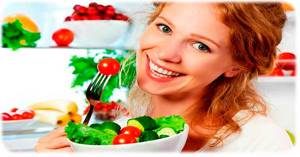
Ethical reasons for vegetarianism
Well, who among us has not at least once heard in response to the question: “Why don’t you eat meat?” - “I don’t eat the meat of killed animals!” Moreover, such comrades may look with contempt at those who happily eat a chicken leg or fried fish. After all, in their thoughts, on a plate lies a living creature, against whom a crime was committed and they killed him in order to fill their stomachs.
Let's get to the heart of these words - isn't it true? They all say it correctly. Fish, birds, pigs, cows and other representatives are not originally intended for our stomach. The majority, of course, will argue that they do not consider this moment unethical. And of course he continues to eat living “flesh”.
Vegetarians, in turn, give another, weighty argument - a person can only eat plant foods, it contains everything the body needs. A carnivorous comrade will answer without a twinge of conscience that animal food has accompanied man almost from the moment of his appearance on earth. And other representatives of the fauna - wolves, lions, tigers and others also do not shy away from eating something meat. So nature ordered it this way. In short, listening to the arguments of both, you understand that each of them is right in their own way. And you can argue with each of them.
Looking at everything from the outside, you understand that the question is not so much about the ethical aspect as about the suffering of a living creature that comes to our table. It’s just that everyone puts a “shadow on the fence” and confuses most of us. To put it simply, we torture and kill animals because of our food preferences. Although we can do everything to prevent it from feeling pain and suffering.
After all, for many centuries people ate living flesh. They worked on breeding and created species of animals that could be used in cooking. And no one should touch wild animals in their original form, because this is the gene pool of the planet. The only thing that should be allowed is the hunting of animals by animals. We cannot destroy the natural course of events, selection, in which the strongest devours the weak.
Disadvantages of vegetarianism

No matter how many positive aspects the vegetarian trend has, eating only vegetables and fruits is not able to fully satisfy all the needs of the body. It is for this reason that nutritionists treat it with caution and some negativity. The harm of vegetarianism is associated with the following points:
- Satiety passes very quickly - after a couple of hours you want to eat again. For this reason, it is necessary to constantly have light and healthy snacks on hand, so as not to end up with junk food. This negatively affects the functioning of the digestive system, as it begins to literally wear out.
- Insufficient intake of vitamin B2. It is necessary to compensate for the deficiency of the component by consuming soy, various food additives, and pharmaceutical complexes.
- Lack of animal protein. This is the main disadvantage of vegetarianism. Without it, the body begins to malfunction. The functions of reproduction and immunity are impaired. Many solve this nuance by forming a diet so that the combination of components in each meal is as close as possible to the composition of animal protein.
- Lack of vitamin B12. Only a few people know that it is found in sufficient quantities only in animal foods. The vitamin is also found in seaweed, but in such a tiny amount that to compensate for its deficiency in the body you will have to eat whole kilograms of the product.
- Deficient iron intake. Plant foods are rich in this component, but it is contained in a “closed” form, less accessible to humans. As a result, many vegetarians begin to suffer from iron deficiency anemia.
- Financial inaccessibility of some products. A vegetarian's diet should be as balanced and varied as possible. The cost of some products, especially out of season, is the same as meat and fish. It is also worth noting the slow saturation with vegetable and fruit components. Much more of them are required, which also involves increased costs.
Contraindications
Very cautious people are afraid to start. Is it possible to determine that there will be no problems? Let us remind you that there is a separate group of people who are not recommended to eat only plant foods: pregnant women and immediately after the birth of a baby, children under 15-16 years old, elderly people and after operations. The rest will have to explore for themselves.
Contraindications to switching to a vegetarian diet are as follows:
- gastritis and any disturbances in the gastrointestinal tract;
- nervous breakdowns;
- physical fatigue, emotional and nervous exhaustion of the body;
- regular consumption of alcoholic products, smoking;
- lack of vitamin B12, calcium in the body (in this case, take BIO supplements during your diet containing such vitamins).
The benefits and harms of vegetarianism for women

Modern women are much more likely to switch to a vegetarian diet. For representatives of the fair half it is incredibly useful. Here are a few facts that indicate a positive effect on the female body:
- Fast and effective weight loss without a chance of regaining the lost kilograms. The body mass index of vegetarians is much lower than that of those who prefer meat foods.
- Those women who play sports can pay attention to quickly achieving sports results and easily maintaining their shape with constant consumption of plant foods.
- Due to the presence of antioxidants and vitamins in the products, aging is slowed down and the immune system is stimulated. Vegetarians look young and fresh for much longer. Vegetarianism is an excellent cosmetic effect.
- Vegetarians are less likely to develop ovarian and breast cancer. It is the consumption of meat products that contributes over time to the accumulation of substances that cause these cancers.
However, you can often find statements with arguments against the transition of girls to vegetarianism. Even with enormous benefits, sometimes consuming exclusively plant-based products can have a negative impact on the body. For example, following the principles of vegetarianism is not recommended for pregnant women.
However, there are many examples of vegetarian women giving birth to healthy babies. In this case, the harm to the female half of plant nutrition is very individual and relative. Before committing to this lifestyle, it is best to consult with a specialist.
What indicators should vegetarians monitor?
Anastasia Kolpakova advises first of all to pay attention to general well-being, body weight and muscle mass.
In addition, it will be useful to monitor blood parameters: hemoglobin, determination of the total iron-binding capacity of blood serum, vitamins B12 and D in blood serum.
Now you can also take a genetic test and determine whether a person can be a vegetarian at all, and whether a new type of diet will harm health. Kazakhstan already has laboratories engaged in such diagnostics.
How to go vegetarian
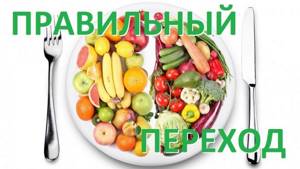
Have you learned about the benefits and harms of vegetarianism and decided to also become a follower of this movement? A completely understandable question arises: “Where to start?” We offer some useful tips to help make the transition as safe and efficient as possible:
- It should be understood and accepted from the very beginning that the transition process is long. It takes at least a month to completely rebuild the body.
- It is strictly forbidden to exclude meat from your diet on one day. It is necessary to create a special diet during which the body will prepare to function without meat and its derivatives. A sharp ban is digestive problems.
- We “get rid” of meat gradually. We draw up a schedule, gradually reducing the number of “meat” days. We make replacements with legumes and cereals.
- After giving up meat, we remove seafood from the diet, replacing them with nuts, roots and seeds. It is useful to eat seaweed during this period.
- During the transition period, we give preference to Japanese cuisine, but without the meat component. If you decide to completely give up “animal” products, including milk, you can replace it, for example, with a product made from coconut or almonds. Butter is an excellent substitute for peanut butter. Also tasty and healthy.
- There is no need to unload your menu from bakery products. Don't forget that most often eggs are not included in the composition. We give preference to yeast-free brands.
- We are mentally preparing for the transition to vegetarianism. We remember that animals die a violent death in order to end up on your table. This will reduce the desire to eat a piece of meat or sausage.
Simple menu for vegetarians
Considering the foods that vegetarians most often choose, it seems that the daily diet does not require much creativity, and the preparation of dishes does not take much time. Let's not forget that each of us sometimes wants variety, for example, ordering pizza for dinner instead of cutlets with pasta. Even the most incorrigible vegan sometimes wants to replace a light spring salad with pasta with teriyaki sauce. Thus, some products are not well understood by the majority of the population, and are also rarely found on shelves in Russia: quinoa, Thai rice and others.
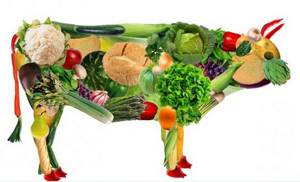
If you want to strengthen your willpower and get rid of your addiction to food, but don’t want to search for exotic fruits and plants with unpronounceable names, we bring to your attention a couple of simple diets based on dairy products, eggs and fish.
Diet No. 1
Breakfast. Immediately after waking up, the first thing that should go into your stomach is a glass of warm (not hot!) water with honey (or without), add lemon. Ideally, this should become a daily rule. Thus, we start the work of the stomach.
Prepare oatmeal (flax, fiber). Sweeten with berries or honey.
Before lunch, have a fruit snack: bananas, tangerines, pears.
Dinner. Since childhood, we have been taught to eat “liquid” foods for lunch - soup or borscht, chicken broth. We offer the most vegetarian borscht.
Ingredients:
- cabbage;
- onion;
- beet;
- tomatoes;
- potato;
- garlic;
- carrot;
- Bell pepper;
- Bay leaf;
- dill.
If the second course is an obligatory component of your lunch, you can prepare fish cutlets (if the goal of the diet is to lose weight, vegetable cutlets will do) with buckwheat porridge.
Afternoon snack. The same snack (vegetables and fruits) or treating yourself to baked apples is incredibly healthy (especially for the female body).
Dinner. For vegetarians, the evening meal is the lightest meal. This is fundamentally different from what the average person on the planet prefers to consume. We rush home from work, hungry and tired, and enjoy fried potatoes and meat. Try the following option (dedicated to pasta lovers).
Ingredients: spaghetti with tomatoes, cucumber, basil and radish salad.
What could be the damage?
If you make the wrong transition (too abruptly, without a preliminary examination of your health), you can cause damage and provoke an exacerbation of chronic ailments.
During pregnancy and lactation, drastic changes are not advisable. It is better to make some adjustments that will have a beneficial effect on the condition of the mother and baby: more fresh fruits and vegetables, switching to white (chicken, rabbit) and fish.
You can practice separate meals, which will have a positive effect on the digestion process: there will be no heartburn, a feeling of heaviness, flatulence, and vital energy will increase.

Therefore, if you want to change your diet, any representative of the fair sex should first consult a doctor, and, if the need arises, undergo an examination and a course of maintenance therapy. You should definitely undergo an examination by a gynecologist.
Several recommendations for the correct transition to a vegetarian menu
In order not to harm your body, the transition to vegetarianism should be smooth. You shouldn’t give up all animal products overnight. This will become a real stress for the body and can provoke negative consequences. If you decide to become a vegetarian, follow these guidelines:
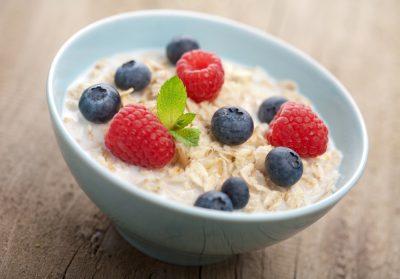
- Reduce the amount of animal products you consume gradually. On average, it will take about a month to completely abandon them.
- A week after starting a new eating style, you can give up seafood. At the same time, the diet should contain dairy products, mushrooms, legumes and nuts.
- If you want to give up animal milk, replace it with soy or almond milk. Peanut butter can be used as an alternative to butter.
- Don't limit your bread intake. Modern baked goods do not use chicken eggs.
- Junk foods are strictly prohibited. Avoid fried potatoes, soy cutlets and other similar foods.
- Replace meat with plant-based alternatives. For example, instead of dumplings, prepare dumplings with berries. Prepare carrot or beet cutlets.
- Eat more cereal. They will help compensate for the lack of some microelements essential for health.
- Don't get carried away with a raw food diet. Vegetables are best stewed or steamed. Fresh vegetable salads can only be eaten occasionally.
- At first, increase the amount of food you eat. As soon as you feel hungry, immediately have a snack. Remember that a serving of vegetarian food should be one and a half to two times the amount of a meat dish.
Before switching to a vegetarian diet, prepare yourself mentally. Try to determine what substances your body lacks. Make up for the deficit. Sometimes this requires taking vitamin and mineral complexes. But before using them, you must consult a specialist.
Develop the right menu. Try to include as many foods as possible in your diet. Come up with new dishes. These can be all kinds of salads, stews, soups and so on.
Switching to vegetarianism must be under the supervision of an experienced nutritionist. Before this you will have to undergo a full medical examination. This will help identify the presence of possible contraindications.
Excursion into history
Mentions of vegetarianism go back several thousand years, in countries where Hinduism and Buddhism are practiced, but the term itself appeared at the same time as the creation of the British Society in 1842.
The name comes from the word “vegetus”, which means healthy, strong, cheerful, fresh and vigorous, and the definition refers to both the physical state and the mental and spiritual one.
There are several types, the differences lie in what is eaten. Conventionally, we can distinguish two main ones: strict, where any type of meat, poultry and fish, milk, and eggs are prohibited. This menu is preferred by vegans, and if they do not use heat treatment for cooking, then these are raw foodists.
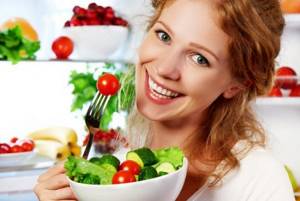
The strict type has its advantages:
- there is a strong cleansing of the body from mucus, toxins and waste,
- cells and tissues are restored,
- a person receives a colossal charge of energy.
However, this type has its drawbacks: it is not recommended to switch to it if you have chronic illnesses, abruptly, without a transition period.
And it’s better for a period of 2-3 weeks to 40 days - this is quite enough for a positive effect. This regime is difficult to maintain, especially in harsh climatic conditions.
Less strict includes everything except meat. This option is often recommended by doctors as a prevention and therapy for various diseases for a given period of time.
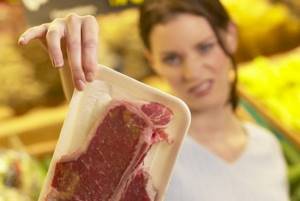
It is indicated for both children and the elderly, it helps improve the functioning of the gastrointestinal tract and other internal organs, reduces blood pressure and sugar levels, and has a general strengthening effect.
